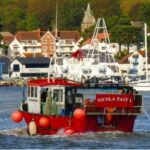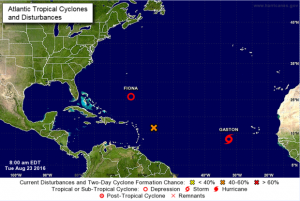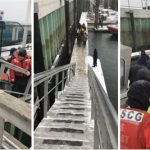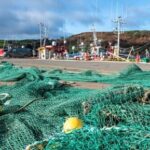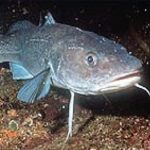Tag Archives: Oceans
Government of Canada invests over $65M in Marine Search and Rescue services as part of the Oceans Protection Plan
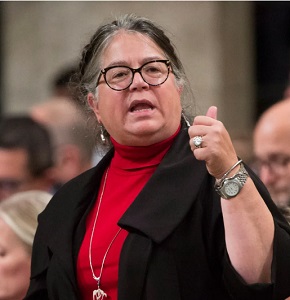 Today, the Minister of Fisheries, Oceans and the Canadian Coast Guard, the Honourable Diane Lebouthillier announced $24.29 million in funding, with $3.37 million ongoing, to expand Indigenous search and rescue training and exercising on all coasts, and a $34.1 million investment in the Canadian Coast Guard Auxiliary, with $4.85 million ongoing, through the Oceans Protection Plan over the next nine years. This funding will increase community-based search and rescue capacity across the country and save critical time during incidents. It will support auxiliary units with training and exercising and purchasing new equipment. This funding will also help with search and rescue training for members of Indigenous coastal communities who play a key role in marine safety, have expertise in navigating local waters, and share ties to Canada’s oceans and waterways that span generations. >>click to read<< 13:53
Today, the Minister of Fisheries, Oceans and the Canadian Coast Guard, the Honourable Diane Lebouthillier announced $24.29 million in funding, with $3.37 million ongoing, to expand Indigenous search and rescue training and exercising on all coasts, and a $34.1 million investment in the Canadian Coast Guard Auxiliary, with $4.85 million ongoing, through the Oceans Protection Plan over the next nine years. This funding will increase community-based search and rescue capacity across the country and save critical time during incidents. It will support auxiliary units with training and exercising and purchasing new equipment. This funding will also help with search and rescue training for members of Indigenous coastal communities who play a key role in marine safety, have expertise in navigating local waters, and share ties to Canada’s oceans and waterways that span generations. >>click to read<< 13:53
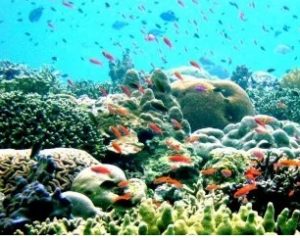
CO2 Not A Threat To Oceans
For the past three decades, the public has been taught by the news media and the folks who make a living composing mathematical equations they claim to simulate how our planet’s climate operates, that our oceans are in jeopardy.,,, Even if atmospheric CO2 concentrations triple from today’s four percent of one percent, which would take about 600 years, today’s surface pH of 8.2 would plateau at 7.8, still well above neutral 7. Now comes along biologist Jim Steele of the CO2 Coalition and former Research Director of San Francisco State’s Sierra Nevada’s Field Campus to drop a blockbuster of truly new knowledge. By Dr. Jay Lehr >click to read< 10:03
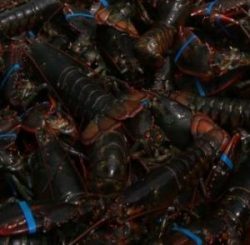
The Data Shows Record Lobster Production
Marine fisheries data show New England lobstermen are benefiting from a new golden age of lobster, thanks in large part to a warming Earth. Yet Democrats in Congress and even lobster lobbyists asserted in House climate hearings earlier in February that global warming is causing a lobster apocalypse. Thankfully, facts and scientific evidence can help us put this latest global warming scare to rest.,,, Overlooking for the moment that Democrats’ PETA allies would consider it good news if global warming were inducing lobsters to relocate to waters where lobstermen can’t reach them, let’s take a look at lobster production in Maine and the rest of New England in recent decades. >click to read<09:36

Record Lobster Production Defies Alarmist Climate Scare
Marine fisheries data show New England lobstermen are benefiting from a new golden age of lobster, thanks in large part to a warming Earth. Yet Democrats in Congress and even lobster lobbyists asserted in House climate hearings earlier in February that global warming is causing a lobster apocalypse. Thankfully, facts and scientific evidence can help us put this latest global warming scare to rest. On February 7, Democrats in the House Natural Resources Subcommittee on Water, Oceans, and Wildlife held hearings with the purpose of raising concern about global warming. >click to read<14:33
Subcommittee Hearing: Healthy Oceans and Healthy Economies: The State of Our Oceans In the 21st Century – Video, >click to watch<

North Vancouver MP Jonathan Wilkinson appointed minister of fisheries, oceans, and the Canadian Coast Guard
The last seven federal fisheries ministers have represented ridings in Atlantic Canada and one of them, Gail Shea, was appointed twice. But today, Prime Minister Justin Trudeau appointed a B.C. MP, Jonathan Wilkinson, to take over this portfolio from Dominic LeBlanc. Wilkinson was first elected in 2015 to represent North Vancouver in Parliament. The last B.C. fisheries minister was Herb Dhaliwal, who held this position from 1999 to 2002. He was preceded by another B.C. MP, David Anderson, who was fisheries minister from 1997 to 1999. Wilkinson is also the minister responsible for the Canadian Coast Guard. >click to read<18:51
Clinton Outlines Policy on Coasts, Oceans in Response to Letter from 115 Ocean Leaders
 Like it or not, surfers are stakeholders. A group of people with skin in the game regarding the health of our oceans. That manifests itself differently for everyone. Some just want to rest assured they can have fun in the water every once in a while without getting sick or dying. Others use it as a springboard to become a full fledged environmentalist, fighting to minimize global reliance on plastics, and otherwise reduce pollution. But regardless of where surfers fall individually along the spectrum, government policy toward oceans and coastlines matters collectively to the surfing population. U.S. presidential candidates have spoken at length about issues ranging from gun control to immigration, but a contingent of “ocean leaders” felt details about how each candidate would address oceanic and maritime issues were underrepresented. That’s why the group of 115, made up of CEOs of seafood companies and other businesses, directors of major science labs, aquariums and diver organizations, well-known ocean explorers, authors, artists, ocean conservationists, members of Congress and former heads of the EPA and NOAA, collectively addressed both Hillary Clinton and Donald Trump in a two-page letter. Read the story here 08:04
Like it or not, surfers are stakeholders. A group of people with skin in the game regarding the health of our oceans. That manifests itself differently for everyone. Some just want to rest assured they can have fun in the water every once in a while without getting sick or dying. Others use it as a springboard to become a full fledged environmentalist, fighting to minimize global reliance on plastics, and otherwise reduce pollution. But regardless of where surfers fall individually along the spectrum, government policy toward oceans and coastlines matters collectively to the surfing population. U.S. presidential candidates have spoken at length about issues ranging from gun control to immigration, but a contingent of “ocean leaders” felt details about how each candidate would address oceanic and maritime issues were underrepresented. That’s why the group of 115, made up of CEOs of seafood companies and other businesses, directors of major science labs, aquariums and diver organizations, well-known ocean explorers, authors, artists, ocean conservationists, members of Congress and former heads of the EPA and NOAA, collectively addressed both Hillary Clinton and Donald Trump in a two-page letter. Read the story here 08:04
Nunavut MP Hunter Tootoo named minister of Fisheries, Oceans and the Canadian Coast Guard
 Nunavut MP Hunter Tootoo has been named minister of Fisheries and Oceans and the Canadian Coast Guard in Prime Minister Justin Trudeau’s new cabinet. He’ll become Canada’s second Inuk to be appointed as a senior federal cabinet minister as he’s sworn in Wednesday morning at Ottawa’s Rideau Hall. The Fisheries and Oceans ministry is a diverse one that will take Tootoo from coast to coast to coast. The department also oversees sealing. That’s been a contentious issue in the Atlantic provinces and in Nunavut, where Inuit hunters have suffered due to the European Union’s ban on seal products. Read the rest here 14:29
Nunavut MP Hunter Tootoo has been named minister of Fisheries and Oceans and the Canadian Coast Guard in Prime Minister Justin Trudeau’s new cabinet. He’ll become Canada’s second Inuk to be appointed as a senior federal cabinet minister as he’s sworn in Wednesday morning at Ottawa’s Rideau Hall. The Fisheries and Oceans ministry is a diverse one that will take Tootoo from coast to coast to coast. The department also oversees sealing. That’s been a contentious issue in the Atlantic provinces and in Nunavut, where Inuit hunters have suffered due to the European Union’s ban on seal products. Read the rest here 14:29
U.S. to focus on climate change, oceans as new chair of Arctic Council
 The United States is starting its term as chair of the Arctic Council by adamantly steering clear of geopolitical and military issues, in favour of focusing on social and environmental stewardship of the North.,, The U.S. plans to put climate change at the centre of its leadership. Kerry said that there is a plan in place to try to curb black carbon and methane emissions which, he said, have more devastating environmental effects than C02. Read the rest here 10:38
The United States is starting its term as chair of the Arctic Council by adamantly steering clear of geopolitical and military issues, in favour of focusing on social and environmental stewardship of the North.,, The U.S. plans to put climate change at the centre of its leadership. Kerry said that there is a plan in place to try to curb black carbon and methane emissions which, he said, have more devastating environmental effects than C02. Read the rest here 10:38
Senator Cantwell Speaks On The Pacific Coastal Salmon Recovery Fund
 During the hearing, Cantwell also asked about the impact of budget cuts on Washington state’s West Coast groundfish fishery’s observer program, as well as the ongoing U.S.-Canada Pacific Albacore Treaty negotiations, and what was being done to ensure U.S. fishermen have fair access to albacore tuna. continued
During the hearing, Cantwell also asked about the impact of budget cuts on Washington state’s West Coast groundfish fishery’s observer program, as well as the ongoing U.S.-Canada Pacific Albacore Treaty negotiations, and what was being done to ensure U.S. fishermen have fair access to albacore tuna. continued

































